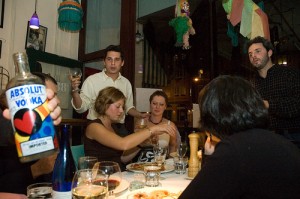
The era of bothersome consumer surveys and robo-calls may be coming to a close, as these shallow techniques of data collection just don’t cut it in the information age. In a recent article in The Atlantic, Graeme Wood describes a growing trend in market research: big business hiring social scientists to do fieldwork. Corporations have long researched the quantitative aspects of their sales, but qualitative knowledge about the use of the products has been somewhat limited. Social scientists and those business researchers known as “consumer behavior” (vs. “quantitative”) economists—long since part of the business discussions within academia—are now being hired to uncover how products are used, as well as who uses them and how those users feel about the products.
After realizing that they new little about the home consumption of their product, for instance, Absolut Vodka commissioned ReD, a forerunner in what we might think of as anthropological market research, to study the home party scene and the rituals and norms of drinking. One consultant on the project, former Yale anthropology Ph.D. student Min Lieskovsky, noted some party trends that Absolut quickly applied to their marketing:
‘One after another, you see the same thing,’ Lieskovsky told me. ‘Someone comes with a bottle. She gives it to the host, then the host puts it in the freezer and listens to the story of where the bottle came from, and why it’s important.’ And then, when the bottle is served, it goes right out onto the table with all the other booze, the premium spirits and the bottom-shelf hooch mixed together.’
The quality and status of the liquor seemed to be much less important to the consumer than their personal association with it. Despite years of market research, without this use of social science, the social significance and human connection of the product might have gone overlooked—and fewer bottles of Absolut might have gotten sold.

Comments 3
Friday Roundup: March 15, 2013 » The Editors' Desk — March 15, 2013
[...] Mega-Corps and Micro-Soc on Citings and Sightings [...]
Bettye — March 20, 2013
If this nutty, earthy tea does not seem to your satisfaction then why not try other calming, stress
relieving teas like peppermint, chamomile or chilli chai tea.
Experts also provide fast shipping services to you as per your requirements at your doorsteps.
At home, I stared at the leaves as I tried to decide how to brew them.
March 2013 TSP Media Award for Measured Social Science » Citings and Sightings — April 25, 2013
[...] author Andrew Wiebe wrote a citing on this article which outlines the problem-solving Absolut Vodka did with the help of [...]